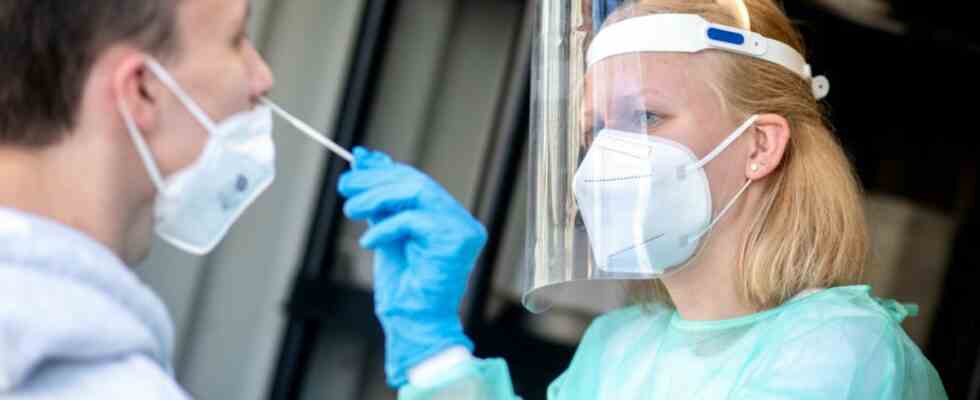According to the Robert Koch Institute (RKI), people in Germany should again follow the recommendations for avoiding infection. According to the Covid-19 weekly report from the RKI from Thursday evening.
It also mentions changed developments in hospitals. The authors note that the burden on capacities in healthcare, especially in the inpatient and intensive care areas, has hardly decreased in the past week. “Based on the increased incidences, an increase in occupancy is currently being forecast.” The number of Covid 19 cases in intensive care units has “increased again compared to the previous weeks”. According to the Divi intensive care register, there were 681 on Thursday. This month the number had dropped to around 610 at times.
According to the RKI, the omicron sublines, which have been increasing proportionally for a few weeks, are already dominant in Germany. “The strong growth of BA.4 and especially BA.5, but also BA.2.12.1, suggests that these variants already make up the majority of the evidence,” the report says. The RKI relies on evaluations of virus variants. This data in the report always refers to the week before last: BA.5 made up around 24 percent of the positive samples in a random sample at the time, which again corresponds to around a doubling of the value from the previous week. BA.4 and BA.2.12.1 were both around four percent.
In the development of the seven-day incidence, the RKI speaks of a significant increase of around one third for the past week compared to the previous week. All age groups are affected. More outbreaks in old people’s and nursing homes and in medical treatment facilities have also been recorded again. “With the further increase in the number of infections, a renewed increase in infection pressure on vulnerable groups of people is to be expected.”
Hotspots in north-west Germany
An RKI map showing the development of the infection process shows many districts with an increased number of cases, especially in north-west Germany. The highest nationwide incidence was recorded on Thursday in the district of Oldenburg with 1554, followed by the district of Coesfeld with 1398. Several districts have already reached incidences above the 1000 mark again.
In particular, risk groups and people over the age of 70 advise the RKI to have a second booster vaccination in accordance with the recommendation of the Standing Vaccination Committee (Stiko). So far, almost every fifth person in the group of people over 60 has received a second booster (19 percent). Based on the total population, 6.4 percent have a second refresher course, and almost 60 percent have the first one.
The Stiko does not want to extend its recommendation for a fourth vaccination for the time being. “We know nothing about the variants that can occur in late summer and autumn. So there is currently no basis for a solid, justifiable recommendation,” says Stiko chairman Thomas Mertens Rheinische Post. A renewed statement from the Stiko on a possible general second booster vaccination only makes sense after the summer. The Greens health expert Janosch Dahmen, among others, had previously discussed expanding the vaccination recommendation.
“We need quick decisions”
Meanwhile, City Council President Markus Lewe is calling for the fastest possible measures to contain the corona summer wave. “We need quick decisions and a new federal infection protection law before the summer break,” Lewe told the newspapers of the Funke media group. It turns out that the instruments available are not sufficient. The cities should be able to act if Corona continues to spread by leaps and bounds. “The corona pandemic must not keep surprising us.”
Lewe, who is mayor of the city of Münster, has called on the federal and state governments to extend free citizen tests and keep the municipal vaccination centers operational. If necessary, he also advocates the obligation to wear masks indoors, for example in retail. “The same applies to 3G or 2G rules, i.e. access for those who have been vaccinated, those who have recovered and possibly also those who have been tested. The law must be adapted here.”

